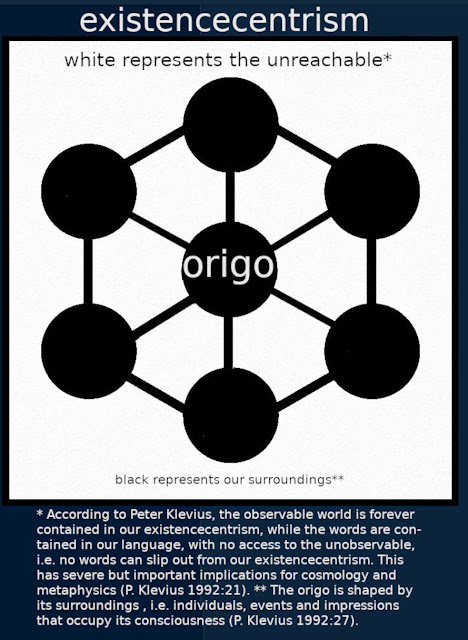Due to $-thieve (since 1971) US push for more religion* against Chinese Atheism, Peter Klevius offers an existencecentrism** tutorial on the meaninglessness of "god" and the concept "meaning of life".
* The absolute majority of men and more than half of women are Atheists although they hesitate to use this word loaded as it is by US anti China Yellow Peril demonization spiced with US Red Scare propaganda.
**
Do note that words like anthropocentrism, humanocentrism etc. don't
cover the meaning of existencecentrism (P. Klevius 1992:21-22), because
they still separate humans from "something else". According to
existencecentrism, words like "nature" etc. are locked to human
existencecentrism - as is any moral discussion about them.
According to Peter Klevius (1992), the observable world is forever contained in our existencecentrism, while words are contained in language, with no access to the unobservable, i.e. no words can slip out from our existencecentrism - not even the word 'out'.
Whereas other
living things have direct contact with their surroundings, human
language makes it possible to lose it. Based on its cultural experience
of humans, an animal can imagine there's a human behind an obstacle, no
matter it's there or not. However, an animal can never imaging there's a
ghost. And a human may similarly think there's an animal behind an
obstacle. But a human may also think there's a ghost, although lacking
any experience of it. Well, if you didn't get this so please comment and
ask and Peter Klevius will utilize your comment for his answer, to make
it easier for you.
Black represents our surroundings, origo represents the individual, and the totality of black represents humankind**
* According to Peter Klevius (1992), the observable world is forever contained in our existencecentrism, while the words are contained in our language, with no access to the unobservable, i.e. no words can slip out from our existencecentrism. This has severe but important implications for cosmology and metaphysics (P. Klevius 1992:21-22).
** The origo is shaped by its surrounings, i.e. individuals, events and impressions that occupy its consciousness (P. Klevius 1992:27).
Words are cultural artifacts and lack meaning without culture. And although a pencil is able to produce any word in the world, it can't produce a single word outside the world.
A word stops being a word without a framework of culture because the meaning of words and numbers is only operational - withou operation, no word.
This has severe but important implications for cosmology and metaphysics (P. Klevius 1992:21).
The origo is shaped by its surroundings, i.e. individuals, events and impressions that occupy its consciousness (P. Klevius 1992:27).
In Peter Klevius book Resursbegär - in the Nordic creole language called English (after the Nordic Anglo Saxons) it would be translated as Resource Beggar, modernized as Demand for Resources (Klevius 1992, ISBN 9173288411) - on page 22 he notes that the only thing we can know about universe is that it's "infinite" - meaning "nothing" doesn't exist other than as a meaningless word similar to "god" etc. "Infinite" is a (troublesome) local word and can therefore not be meaningfully applied as a "border" of universe. Moreover, as we do understand that our observable universe is constantly changing, and that we therefore may assume something beyond it, this all, including any expectation, always resides within our existencecentrism. For many, the fallacy seems to be the use of language which seemingly can cross any border - except existencecentrism.The living* part of the products of evolution, including human, is distinguished above all by the eternal (in a relative sense) heredity carried forward like the thread of a necklace and protected by the pearls, i.e., the collective life cycles of individuals. The individual starts his life by neutralizing the body's needs (food, heat, etc.). These neutralization efforts leave traces in the data bank we call brain. Experience can later be retrieved in different combinations. We think. Calculating with experience gives foresight. The experiences also give us our relationship with future surroundings. The part of our relationship with our surroundins that is directed at other individuals is called social (P. Klevius 1992). Sorry about self-citations, but they are necessary to prove that these thoughts were oublished long ago and not just here on the blog - so to give the reader a more fair view of Peter Klevius. And as Google and the "academic world" seem to dislike what Peter Klevius writes, it's also beneficial for overall science to repeat his name as much as possible on those few windows of opportunity he can still speak through on before the authoritarian censorship of the now desperate $-freeloader (since 1971) US - which (thanks to its stolen dollar hegemony) controls Western media landscape - closes even the last tiny windows. This btw used to be called fascism. However, it's all about US fear of losing its stolen and extremely dangerous for the world, aggressive militant dictatorship, because of modern meritocratic and high tech China's success. Moreover, it's in this light one needs to see US racist anti-China smearcampaign and demonization. And when China tries to defend itself, then US calls it "autocratic", "dictattorship" etc. - and eagerly followed and parroted by other Western leadership.
* There's no possible definition of what is life or when life starts. Moreover, our most central life machine is our gut microbiome which continues to live after we die. In fact, "we" are just workers for the gut microbiome, and when we stop feeding it, it will ear us instead.
Each individual's relational network is characterized by what we may call its immediate, observable surroundings, i.e. the individuals, events and impressions that occupy consciousness. In the case of humans (and many other animal species), learning/tradition is added. The impact of cultural heritage, heredity and the local surroundings determines our social profile and the two-way communication with the cultural heritage, i.e. what we will take into account from the cultural heritage for our own way of life, and how this in turn (albeit usually on a small scale) affects the overall cultural heritage.
When people stupidly (or deliberately misleading) are asked if they believe in a "god" beyond the world, then the question itself is pushing towards a wanted answer, because "god" in the question is just a word, and as such trapped and confined in cultural settings inside existencecentrism.
And when asked 'Are you an Atheist or a "believer", then many actual Atheists - due to the cultural ballast in the words - often say 'there must be something else', or point to the need of a "meaning of life". The first option deletes itself by the words 'there' and 'else', because there can't be any "there" or 'else' outside existencentrism because that would make the words meaningless when they senselessly bounce back to the origo. And the second option, i.e. "meaning of life" answers itself because the uncertainty it reveals not only resides firmly anchored within existencecentrism, but without that uncertainty there would be no life and therefore no meaning of life. Only an almighty "god" could logically reside in the dead end of entropy (P. Klevius 1981) while still ultimately trapped in our existencentrism. Moreover, even the picture of "allmightyness" would signal 100% bordeom. A bored "god" parasiting on our volatile existencecentrism.Implications for cosmology and metaphysics
Cosmology is forever trapped in its "observable universe" i.e. existencecentrism, in which you may choose between "beliefs" and logic. If you believe in ghosts you may even research them with the concept 'ghost' as your axiomatic starting point. However, if you choose logic your axiomatic starting point is your entire existencecentrism - meaning your logic is protected from senselessness by others. The concept of existencecentrism hence eliminates metaphysics, which is just a sloppy and arbitrary made up category with endless sub-categories (not to be confused with Aristotle's) beginning with the meaningless "distinction" between 'abstract' and 'concrete'.
Chinese existencecentrism
Does Wikipedia try to "adapt" Chinese Atheism to fit "monotheist"
stupidity? It could have made it much easier for people to understand
the enormous difference between logical Taoism and senseless*
"monotheisms", instead of blurring it.
* Dear reader, Peter
Klevius has all respect for the good part of traditions, no matter if
they are embedded in "religion" or Atheism. However, whereas Atheism is
risk free, "monotheist" religions pose a security risk against basic
(negative) Human Rights (UDHR). Also consider that the most powerful
"monotheist" theocracy, i.e. dollar embezzler (since 1971) US theocratic
Supreme Court has long since abandoned UDHR "when it's not in US
interest".
China is officially an Atheist state and as the world's oldest civilization it has always been - every society has been Atheist until the weird "monotheism" parenthesis came about as tool for keeping women sex segregated and reproducing "infidel" hating children. Taoism is Atheism* of Chinese origin and emphasizes living in harmony with the Tao (Chinese: 道; pinyin: Dào; lit. 'Way', 'Thoroughfare'); the Tao is defined as the source of everything and the ultimate principle underlying reality.
Do understand that the unity before Yin and Yang is precisely what Peter Klevius (1992:21-22) calls the primordial "lifeless" (Taiji in Chinese cosmology) substance of which the world is made - not a "god" outside the world. This simple fact, i.e. creation from something already existing in the world by dividing it in two, has all cultures in one form or another understood - except "monotheisms" which introduced an almighty male who first created the world and then manipulated it from his safe position outside the world!
Wikipedia: Yin and yang (English: /jɪn/, /jæŋ/), also yinyang or yin-yang, is a concept that originated in Chinese philosophy, describing an opposite but interconnected, self-perpetuating cycle. Yin and yang can be thought of as complementary (rather than opposing) forces that interact to form a dynamic system in which the whole is greater than the assembled parts. The technology of yin and yang is the foundation of critical and deductive reasoning for effective differential diagnosis of disease and illnesses within Confucian influenced traditional Chinese medicine.
In Chinese cosmology, the universe creates itself out of a primary chaos of material energy, organized into the cycles of yin and yang and formed into objects and lives. 'Yin' is retractive, passive and receptive while 'yang' is active, repelling and expansive; in principle, this dichotomy in some form, is seen in all things—patterns of change and difference, such as seasonal cycles, evolution of the landscape over days, weeks, and eons (with the original meaning of the words being the north-facing shade and the south-facing brightness of a hill), sex (female and male), as well as the formation of the character of individuals and the grand arc of sociopolitical history in disorder and order.
Taiji is a Chinese cosmological term for the "Supreme Ultimate" state of undifferentiated absolute and infinite potential, the oneness before duality, from which yin and yang originate. It can be contrasted with the older wuji (無極; 'without pole'). In the cosmology pertaining to yin and yang, the material energy which this universe was created from is known as qi. It is believed that the organization of qi in this cosmology of yin and yang has formed everything including humans. Many natural dualities (such as light and dark, fire and water, expanding and contracting) are thought of as physical manifestations of the duality symbolized by yin and yang. This duality, as an unity of opposites, lies at the origins of many branches of classical Chinese science and philosophy, as well as being a primary guideline of traditional Chinese medicine, and a central principle of different forms of Chinese martial arts and exercise, such as baguazhang, tai chi, and qigong, as well as appearing in the pages of the I Ching.
Peter Klevius: Taiji is the primordial state (P. Klevius 1992:21) while Yin and Yang represent our observable world with its dynamics that blesses us with uncertainty while harmonizing it in a totality. Do note again that even the primordial state is conyained in our existencecentrism although it also implies the borders of it.
As Peter Kleviuus wrote in an article published 1981: The basic element in existence is change, which enriches our surroundings with uncertainty in our bubble of existencecentrism, hence producing what is in itself the "meaning of life" - instead of trying to use language to in vain push it out from our existencecentrism.





Comments
Post a Comment